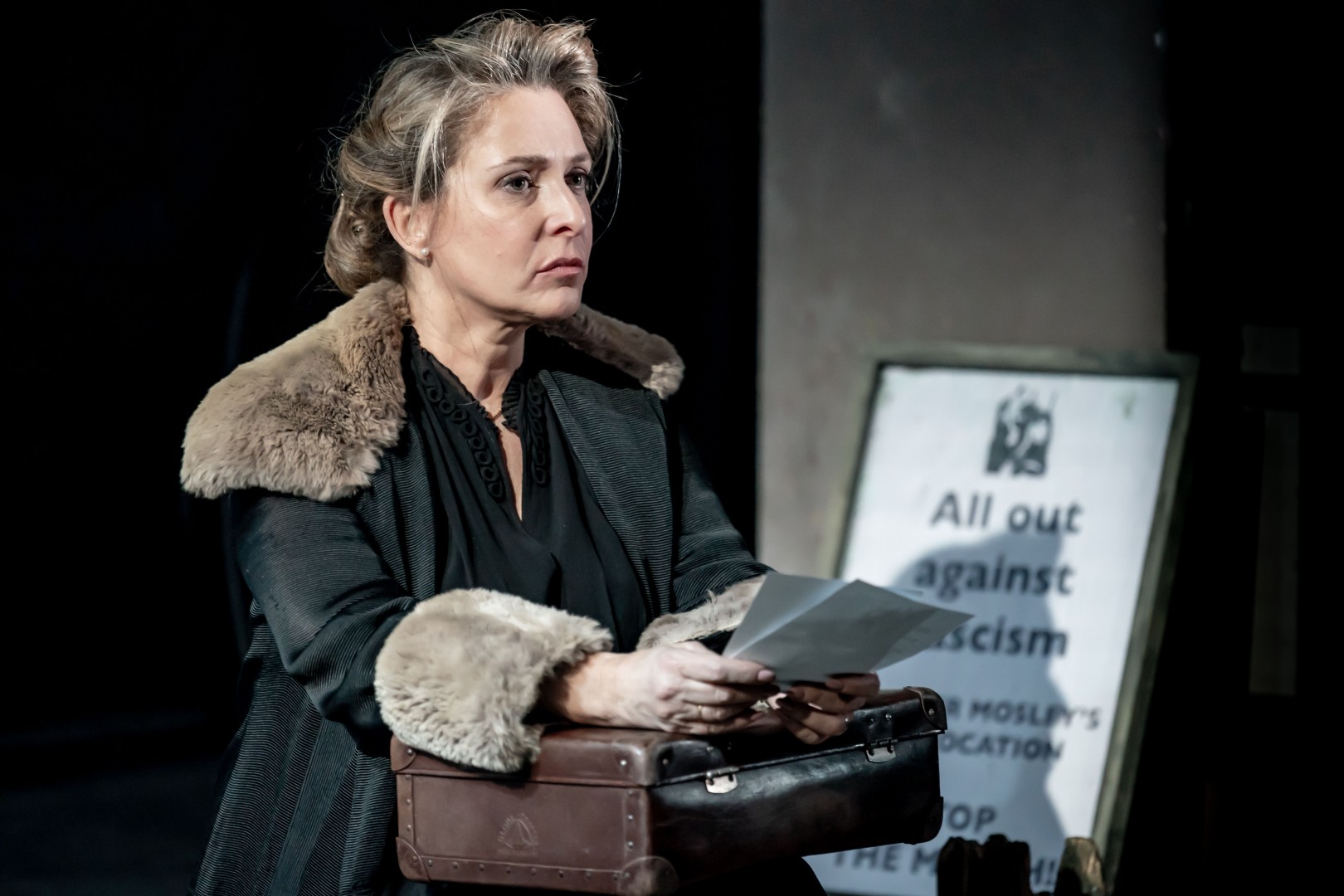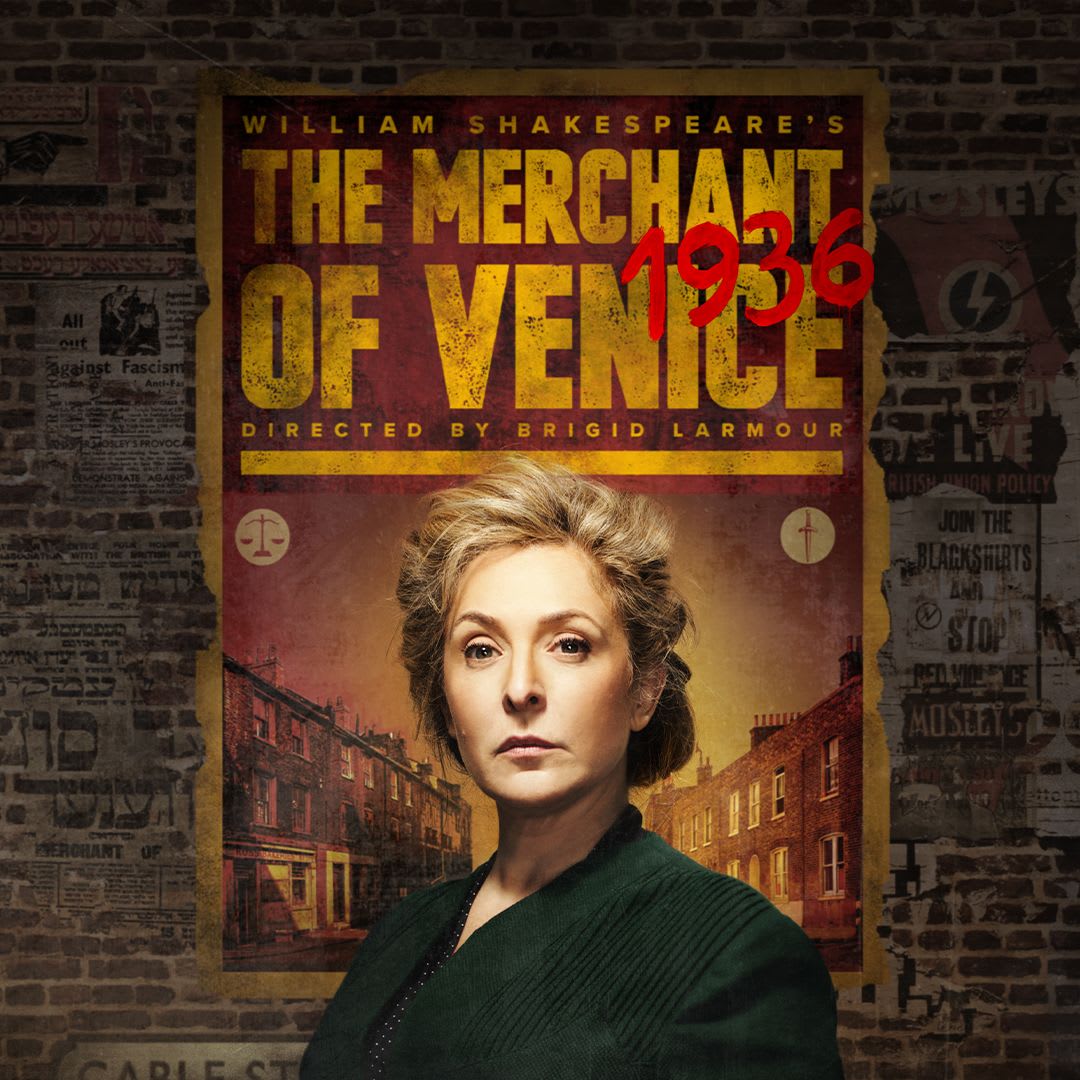The Merchant of Venice is widely recognised as one of Shakespeare’s more difficult plays due to the antisemitic tropes it perpetuates. Many productions have attempted to grapple with this, with mixed results.
In her ground-breaking interpretation, The Merchant of Venice 1936, Tracy-Ann Oberman has swapped sixteenth century Italy for 1930s Britain, and taken on the role of Shylock herself; presenting the character through a wholly new lens. As a huge fan of Tracy-Ann O in all her characters – she killed Dirty Den! She battled with Dr Who! She is Friday Night Dinner’s Auntie Val, for crying out loud! – I jumped at the chance to speak with her and learn more.
I understand this production has been a very personal project.
The Merchant of Venice 1936 has the creation my life, really. It’s very personal because it is the first female Shylock and I based her very much on the matriarchs in my family. My great grandmother Annie, my great aunt, ‘Machine Gun’ Molly, and the other one Sarah Portugal who smoked a pipe and wore a slash of red lipstick. These were tough, strong immigrant women who had come over from Eastern Europe where there was terrible pogroms and antisemitism. They came over to England and lived in the East End. They were widows and ran their little schmutter business, as they called it. Market stalls and the money lending: they ran it with a rod of iron. They were very religious and very loving to their family, but they were terrifying as well. So, I wanted to honour those women. I wanted to honour my great grandmother and my grandmother who stood against Oswald Mosely at the battle of Cable Street and the British Union of Fascists. Also, I wanted to reclaim a very, very difficult play. There’s no coincidence that this was Hitler’s favourite play, his favourite Shakespeare, and it’s a very hard play to get right. We've got a brilliant teachers pack – an education pack – that we are sending out alongside this, if people want to learn more about the play. So, it’s been a labour of love.

What has the response had been like?
When we took it to Manchester the majority of the audience were not Jewish but they all spoke of a strong auntie or great grandmother or sisters. Often revolution and change start at home, and families are kept together by strong women.
Matriarchs are the ones, they change things, they change families, they change outlooks and they’re often written out of history. Look at the history of the battle of Cable Street, and there were so many women, anti-fascists, that stood against Mosley that day – my great grandmother and auntie being two of them. They were real, they made things happen, the law changed after that.
How is Shylock changed by becoming a woman?
She becomes a single mother who overly protects and overly loves and overly dominates her one daughter, Jessica. I think it shows the antisemitism and misogyny of the upper classes, particularly the men. The court scene becomes a revelation because you see a little woman who thinks the law of the land is going to protect her and the state and church decide to pull together to destroy someone who thinks law is on their side. They destroy her absolutely in the process. She's not likeable, I haven’t changed her. I didn’t want her to be the heroine of the piece. But, I think at least you’re going to understand how a woman who escaped Russia is over here, as an immigrant woman when the British and the English – particularly the aristocracy – find immigrant, tough, strong women repulsive. She's got a kind of Belorussian-Yiddish accent that marks her out from the aristocrats that she lends money to. They wanted women to be quiet, unpolitical, un-opinionated and decorative, which is not what immigrant women are normally like.
I think you may not like the female Shylock but you will certainly understand her, and you will certainly understand what she's been up against. When Antonio talks about spitting on Shylock and kicking Shylock it brings a very different resonance to any production I’ve seen before. We have been very truthful to the play. We haven’t changed anything apart from cut it down, it’s a very short production; two hours with an interval.
Is the play inherently racist?
In Stockholm they did some research and found out that 70% of people who’d seen The Merchant of Venice came out more antisemitic after seeing it than when they went in.
It is very difficult. You know, I do a lot of Q and A’s with schools and audiences afterwards, and audiences really want to talk about this play; it really triggers lots of audiences. Is this an antisemitic play? Howard Jacobsen, who has done a lot of work on this play, maintains that it’s not antisemitic. He said there’s no way that a writer who can write the ‘Hath not a Jew eyes?’ speech (which is a plea to see ‘the other’ has human) could write this.
I think that you can only go by the effect of the play. So, whereas Shakespeare may not have been an antisemite, he was writing the play 200 years after every Jew had been kicked out of England; particularly around the Oxford area, actually, where every single brick was pulled down from the synagogue and the schools and the houses. You know, a lot of Oxford is built with those bricks.
Shakespeare was writing at a time of huge antisemitism, there was the Spanish Armada and also Queen Elizabeth I had a Jewish doctor (Rodrigo Lopes) who she was forced to have hanged, drawn and quartered. I think you can’t help but think about what the audiences were expecting; they wanted to see a horrible Jewish character being destroyed at the end. But, because Shakespeare was such a great writer, he manages to put in a bit of humanity in the character.
Hopefully your teachers’ packs will provide a much-needed resource…
Some people say it should be taken off the curriculum because it is so difficult, and so triggering and so racist. I think we should teach it, but teach it well. Use it as we have done, as an opening of a debate about racism. It’s not just about Jews; it’s about all races, all othering. Use this play as an opportunity to say when did Shakespeare write it, why did he write it, and where do these antisemitic tropes come from? They go all the way back to medieval England. And, then there’s 1936 and the rise of fascism. If Edward VIII hadn't abdicated we would have had a king who was pro-Hitler, pro-fascism and deeply antisemitic. We dodged a bullet.

In Merchant 1936 minorities band together, as they did at Cable Street. Have you found support from other minorities when you’ve spoken out against antisemitism on social media?
When working class communities pulled together and said to Mosley ‘you come for the Jews, you come for all of us’. I have found incredible solidarity when I’ve been speaking out against really horrible misogyny and antisemitism and racism.
Finally, I must touch on Friday Night Dinner in the context of online debates. There has been criticism of the lack of Jewish actors in a programme about a Jewish family. What’s your take?
The casting is such a long debate but what I loved about Friday Night Dinner is that it spoke to everybody who has a family. After the first episode I was in, I remember being in Soho and this Muslim guy ran up to me and said, I saw you on Friday Night Dinner, and I love that show – that’s my family!’. I’ve found that everywhere I’ve gone around England, even if people haven’t even met anyone Jewish, it really speaks to them.
Trafalgar Theatre Productions and Eilene Davidson Productions in association with the Royal Shakespeare Company present the Watford Palace Theatre and Home Manchester production of The Merchant of Venice 1936 at the Wycombe Swan Theatre, 10-14 October.
Book tickets at wycombeswan.co.uk.
Image credit Marc Brenner









